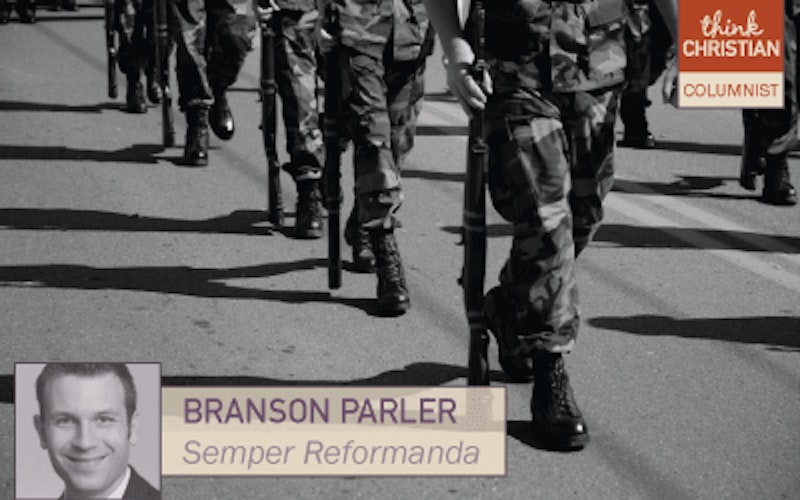
Culture At Large
The weakness of the Pentagon and the power of the cross
A recent discussion at the New York Times’ Room for Debate site asked this question: Is United States military training of foreign forces hopeless, even counterproductive, or can allies be effectively trained to deal with common foes? Sometimes this works, but in many cases - most notably Afghanistan and Iraq - providing military training does not guarantee the outcome hoped for by the Pentagon. From a theological angle, there’s a reason that this training is a “lesson in futility,” as the headline of the article put it.
The picture associated with the article may be worth a thousand words. It shows American and Malian troops, and at the center of the picture is an assault weapon. The main weapon used by the Pentagon, ultimately, is the threat of death or death itself.
In light of the cross and resurrection, Christians should recognize the inherent weakness of this type of weaponry. When Paul talks about the weapons of the Christian, he says it this way: “The weapons of our warfare are not carnal (or worldly), but mighty in God for pulling down strongholds.” John Howard Yoder notes that the contrast here is unexpected. Paul doesn’t say, “Our weapons aren’t worldly, but ‘spiritual.’” He says, “They aren’t worldly, but powerful!” From that angle, the only kind of power that the Pentagon wields is a weakness that can never really accomplish certain things, including real peace.
By contrast, Christians preach the power and wisdom of Christ crucified, a stumbling block to the Pentagon and foolishness to the weapons manufacturers of the world. Christians, however, should not simply sit back and criticize the weakness of the Pentagon. The Pentagon is working with the only weapons it knows. We need to act.
Christians preach the power and wisdom of Christ crucified, a stumbling block to the Pentagon and foolishness to the weapons manufacturers of the world.
How does the power of the cross manifest itself? The church’s call is to proclaim peace and celebrate peace. People who were formerly enemies now find themselves reconciled, as the cross breaks down the wall between them.
The Gospel is the public proclamation that we no longer need to fight God or one another. In Jesus, God has entered our history to broker a treaty between warring peoples. He has united different factions into one new humanity. The Gospel is not simply a message for the individual soul; it is a message for people who have good reason to hate each other. But how will people know this message unless someone proclaims it? In a world filled with wars and rumors of wars, Christians must properly proclaim the peace of God.
The church exists because it celebrates God’s peace. We are not peace-makers or peace-manufacturers in the sense that peace somehow originates from us. No - we are peace-celebrators. Peace is by grace through faith, not by works, so that no one can boast. As we gather around the table of peace and celebration, where we remember Christ’s body, broken by our war with God and one another, we receive Christ’s life as our own. In a world filled with wars and rumors of wars, Christians must properly celebrate the peace of God.
Christians are people who know that the Word is mightier than the sword. Our weapons are not worldly, but powerful: the preaching of the Word who has made peace and the celebrating of the Word embodied in broken flesh and poured-out blood.
Topics: Culture At Large, Theology & The Church, Theology, News & Politics, World, North America